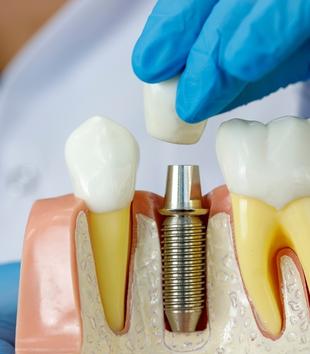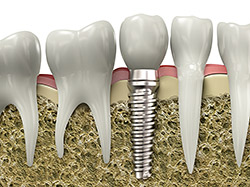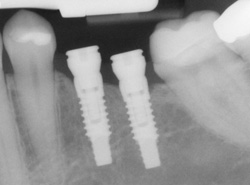Transform Your Smile with Expert Dental Implants in Bellevue, WA

An implant is an artificial tooth root, a cylinder of titanium usually less than half an inch long, which is placed in the jaws. Dental implant were developed in Sweden in the mid-1960s and are used as supports to permanently attach from one to a full set of replacement teeth.
A missing tooth can change a lot more than just your smile. It's common to feel self-conscious in social situations, and it can be hard to chew some foods and speak clearly. At Washington State Prosthodontics and Dental Implant Center, we help people in Bellevue get their smiles back with dental implants. This is a modern, long-lasting solution that looks and feels natural.
Our staff is here to help you find a implants dentist in Bellevue and guide you through every step of the process. We use the latest technology and years of training in prosthodontics to fix your teeth and help you feel better about yourself.
Understanding Dental Implants
A dental implant in Bellevue is a small titanium post that is used to replace the root of a lost tooth. Once it fuses with the jawbone, it creates a strong foundation for a crown, bridge, or denture. Unlike traditional dentures, which may slip or shift, implants are fixed in place and blend into the structure of your mouth.
What makes implants so reliable is the way they interact with your natural bone. Over time, stability is created as the titanium and bone fuse, allowing for chewing and biting as if the tooth had never been lost. For patients considering Bellevue dental implants, this means a long-lasting solution.
Why Patients Choose Bellevue Dental Implants
Every patient has different reasons for seeking treatment. Some want to enjoy their favorite foods again without worry. Others want to speak clearly, smile freely, or stop the bone loss that can change facial shape after teeth are missing.
The advantages of implants often include:
- A natural appearance that blends with your smile
- Stability that allows for normal eating and speaking
- Protection against jawbone shrinkage
- A long-term alternative to removable dentures
In many cases, patients tell us that implants feel so natural, they forget which tooth was replaced. That’s the goal of our dental implants dentistry in Bellevue—to make your smile feel whole again.
What to Expect During Treatment
The implant procedure has steps that have been carefully planned. We will first take 3D pictures of your bones and then give you an exam to learn more about them. If more help is needed, like a bone graft, that is already in the works.
Then, a small operation is done to put the implant in the jawbone. After a few months of healing, the final restoration is put in place. This could be a denture held up by a few Bellevue dental implants, a crown for one tooth, or a bridge for a few teeth. Each case is designed around your needs, never a one-size-fits-all approach.
Who Is a Good Candidate?
Most healthy adults who are missing teeth may be able to get Bellevue dental implants. It's best to have strong bone in the jaw, but even if some bone has been lost, grafting techniques can often make implants possible. For long-term success, it's important to keep your mouth clean and your health in general.
If you lost a tooth because of decay, gum disease, or an accident, dental implants in Bellevue, WA can often give you a stable, long-lasting replacement. We'll go over your options during your consultation and help you decide if implants are the best choice for you.
Recovery and Care
Some pain and swelling are normal for a few days after the implant is put in, but most people can handle it with over-the-counter painkillers. A lot of them go back to work the next day. Following our aftercare instructions carefully, such as eating soft foods at first, brushing gently, and going to the doctor regularly, will help you heal quickly.
Your dental implants Bellevue can last for decades if you brush and floss every day and go to the dentist regularly. They are meant to be a permanent fix, and taking care of them is similar to taking care of your real teeth.
Why Patients in Bellevue Trust Us
To provide accurate, consistent results, we at Washington State Prosthodontics and Dental Implant Center combine years of experience, cutting-edge prosthodontic training, and digital technology. We have personally witnessed how a patient's perspective on life can be altered in addition to their smile when one or more teeth are restored.
You are selecting a team that handles each case with the same level of care that we would want for ourselves or our families when you choose us for dental implants in Bellevue, WA. Our actions are always driven by your comfort, well-being, and self-assurance.
Common Questions About Dental Implants
Is the procedure painful?
Most patients are surprised by how little discomfort they feel. Local anesthesia keeps you comfortable during placement, and any soreness afterward is usually mild.
How long will implants last?
With good care, dental implants Bellevue are one of the longest-lasting tooth replacement options—often lasting 20 years or more.
Will insurance help cover the cost?
Coverage varies by plan. Our team can review your benefits and give you a clear estimate before treatment begins.
Am I too old for implants?
Age isn’t usually a barrier. As long as you are healthy enough for dental care, implants may be an option.
How do implants compare with dentures?
Dentures rest on the gums and can shift. Implants are anchored into the bone, making them more secure and better for chewing.
Take the Next Step
It might be time to look into implants if your lack of teeth is preventing you from moving forward. Our Bellevue staff can help you understand your options, respond to your inquiries, and create a plan that works for you.
To arrange your Bellevue dental implant consultation and begin your journey toward a full, self-assured smile, give Washington State Prosthodontics and Dental Implant Center a call right now.
What is an implant made of?
Implants can be made of pure titanium or a titanium alloy, which makes the implant stronger. They can also be made of Zirconia, a ceramic material. Titanium has been used for over 50 years and has an impeccable track record in terms of biological compatibility. Zirconia implants have been available for nearly 20 years, primarily in Europe. They have been improved over the years and are now FDA-approved in the United States. They can be successfully used in most situations where titanium implants are indicated however, they do have their limitations especially when using implants to replace a full arch of teeth. Contact our office if you are interested in learning more about Bellevue dental implants and these ceramic implants
How much do dental implants cost?
The cost of an “implant” is broken into three parts: the cost of surgical placement, the cost of the implant parts (abutments), and the crown or denture.
The costs can vary depending on the number of implants (more implants, less fee per implant) and the type of material used in the final restoration (porcelain, plastic, or composite). Generally, more experienced surgeons and prosthodontists (with 3+ years of graduate training) will charge more than someone with limited experience (a weekend course). There is also a wide range of costs associated with implant reconstruction.
What makes a quality dental Implant?
High-quality implants cost more than knock-off or clone-type implants. Also, the reconstruction can be made cheaply, by sending them products made outside of the United States, or using cheap materials, or they can be made locally by skilled laboratory technicians. Therefore, as in any medical procedure, the skill of your dental team is a vital part of the success of your final implant restoration. You are not buying a product or a TV, you are buying a service and the skill and expertise of your dental professionals and the quality of the parts used are important to the long-term success of your treatment.
Why would I need a dental implant?
The longer you are missing a tooth or teeth the more the bone and gum ridges shrink. This is called atrophy. If the body is not using a part, in this case, the bone that holds the teeth, then it takes the calcium and puts it somewhere else where it’s needed. Implants are placed in the bone and fool the body into thinking there’s a tooth so bone atrophy stops.
How Long do Implants last?
Implants have a mid to high 90s percentage rate of success after they have integrated. The majority of implant failures occur in the first three months (before integration) if the bone does not heal properly around the implant. Generally, the failures after 3 months are more of a random event and difficult to predict. Poor home care, a history of gum disease, and uncontrolled diabetes tend to increase the risk of long-term failure. The restorative materials, porcelain or acrylic, will fail over time just like a normal crown or denture will fail over time without implants. The restorative materials should last 10 or more years if properly maintained.

Advantages of dentures or Bridges
Conventional bridges and dentures are not fixed to the bone, and can therefore be unstable. This can make it difficult to eat or smile with confidence. Implants not only look more natural but feel and act more like normal teeth, with a stronger biting force. And because they don't directly rely on neighboring teeth for support, implants don't compromise the health of your natural teeth. In fact, bridges are only expected to last seven to ten years, even less with root canals, whereas implants will typically last a lifetime.


 (425) 549-4649
(425) 549-4649









